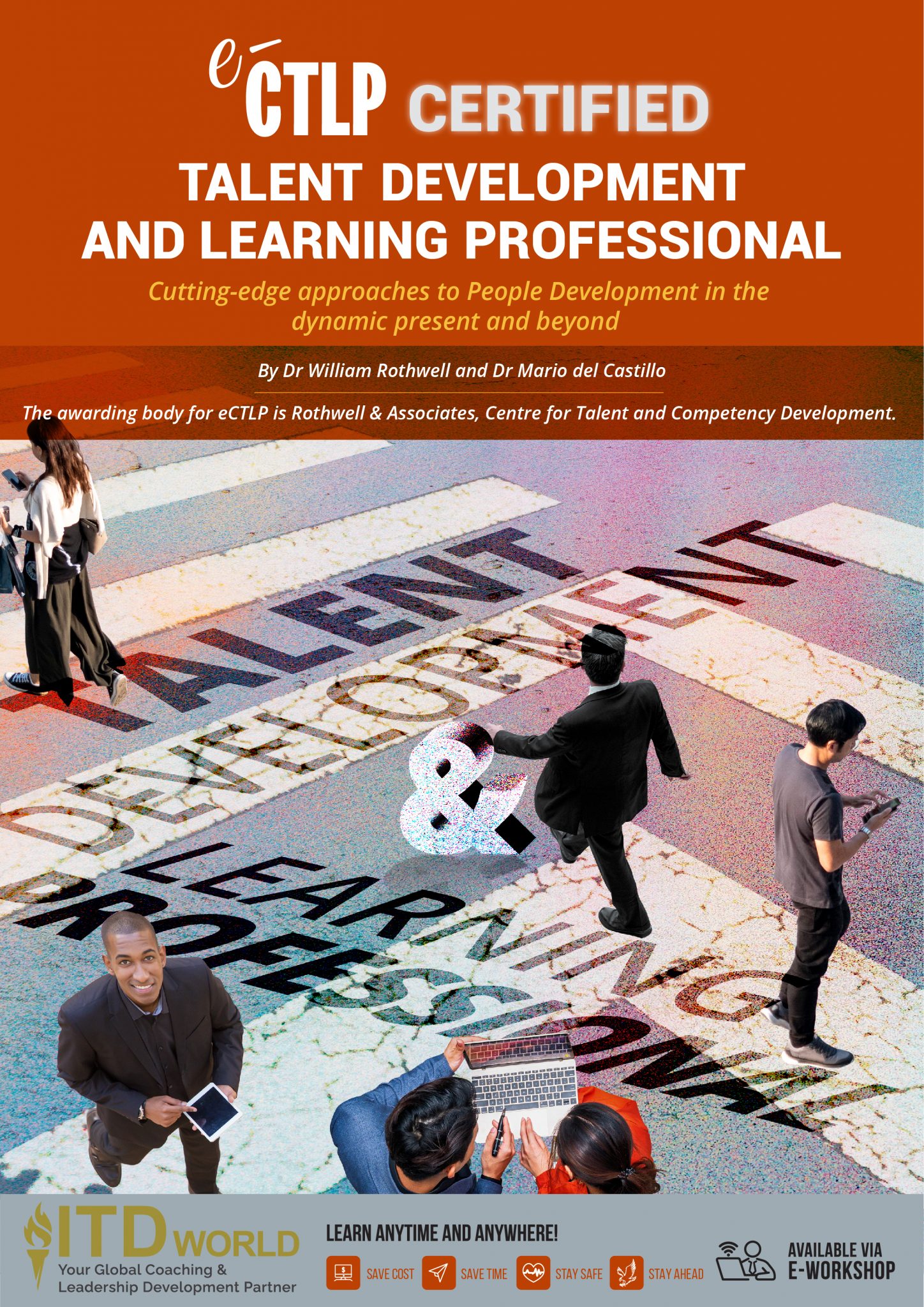Certified Talent Development & Learning Professional (e-CTLP)
ITD World’s learning and development certification course is designed to equip participants with cutting edge approaches to Talent Development in the dynamic present and beyond.
What is a learning and development certification?
A learning and development certification is a professional certification that assesses a person’s competency in learning and development (L&D) practices. It is usually issued by an organization / institution that specializes in this field – such as the Society for Human Resource Management (SHRM).
Overall, when it comes to L&D certifications, there are various types to consider:
- Curriculum development – certifies the ability to build custom learning based on the training need analysis results.
- Instructing & facilitating – certifies the mastery of classroom management and learner instruction.
- HR certifications – certifies expertise in people management, talent acquisition, development and retention.
- Project management – certifies the ability to plan and monitor projects.
- Virtual training – certifies the ability to utilize technology for training.

Reasons to sign up for a learning and development certification course
There are various benefits to attending a learning and development course. First, it shows that you are dedicated to learning and continuing your education. It also demonstrates that you have the skills and knowledge necessary to be an effective learning and development professional.
Additionally, a certification can help you stand out from the competition and may lead to career advancement opportunities.

Introduction to ITD World’s learning and development certification course
The current realities of rapid change and disruption creates new challenges and new opportunities for employers. That principle applies as much—if not more— to talent development and people development than to any other business or organizational practice.
What is needed in the present era and beyond are fresh, cutting-edge approaches that are needed now to cope with the new and unusual, for a more future ready, strategically focused, continually developing, high performing human capital.
At the same time, as talent development evolves into a more learner-enabled process, new competencies will be required of learning professionals. Individual learners will also, with strong support from learning advisers, coaches and mentors be empowered to independently engage into learning experiences.

- How can talent development experiences be reinvented to propel organization into the desired future successfully?
- What does the future hold in store for work, workers, workplaces, and the world outside traditional workplaces?
- How can leaders create work settings where people can effectively learn as they work or even in anticipation of new changes and challenges?
All of the answers above will be address in ITD World’s Certified Talent Development & Learning Professional (CTLP) training program.

Course objectives
Upon completing this program, participants will be able to:
- DISCERN the key trends that are shaping the future of workers, work, work settings and the work environment.
- DEFINE talent and why varied definitions matter in shaping talent programs.
- EXPLORE alternative talent development programs and fresh approaches to people development.
- ALIGN talent programs with organizational strategic goals and direction.
- REVISIT the Analyze, Design, Develop, Implement and Evaluate (ADDIE) model to guide talent development.
- BUILD organizational and individual strengths to meet future needs.
- ALIGN talent development efforts with the lessons from neuroscience.
- WORK towards ensuring transfer of talent development programs from learning to performance.
- ADOPT a 70,20,10 talent development strategy and its evaluation of effectiveness.
- REVISIT the “levels of evaluation” to create a “grid of evaluation” to be used as a list of choices for what should be evaluated including ROI.
- APPLY measures to evaluation like time to deploy and readiness.
- ADOPT coaching and mentoring activities for talent development.
- LEARN how to develop learning ecosystems and ADOPT microlearning.
- IDENTIFY and ASSESS real-time on-the-job learning competence and capabilities.

A training course for learning & development professionals
Certified Talent Development & Learning Professional (CTLP) is created to upskill the following audience:
- Talent Development Heads, Managers and Practitioners.
- Learning and Development Heads, Managers and Senior Executives.
- Training Managers, Directors and Practitioners.
- HR Heads and Professionals.
Course details
CTLP is comprised of 9 virtual sessions – each of which takes 2 hours to complete. Essentially, the course’ content is a combination of our signature Certified Training Professional (CTP) and Certificate in Talent, Competency & Succession Management (CTCSM) training programs.

Session #1 : Trends transforming the future world and the future of talent development
- Key trends shaping the future of workers, work, work settings and the work environment.
- Define talent and explain why varied definitions matter in shaping talent programs.
- Build management support for talent development programs.
- Important trends that shape the future of talent development and why the need exists for fresh approaches to people development.
- Activity on trends shaping the future of talent development.
Session #2 : Transforming talent development programs to meet organizational strategic goals
- Align talent programs with organizational strategic goals.
- Building a talent development framework.
- Align talent development efforts with the lessons from neuroscience >> Activity on applying lessons from neuroscience.
- Ensure the transfer of talent development programs from learning venues to work venues.
- Review session prework assignment on near transfer.
- Review session prework assignment on far transfer.
- Review session prework assignment on applying the “grid of evaluation”.
Session #3 : Transforming the corporate culture to support strategic and tactical talent development
- Defining key terms: Learning organizations, learning climate, and learning agility/ competence.
- Identifying and eliminating barriers to real-time, on-the-job learning.
- Review session prework assignment on identifying and eliminating barriers to real-time, on-the-job learning.
- Models to guide on the job learning and microlearning.
- Applying models to guide on the job learning.
- Identifying and assessing real-time on-the-job learning competence and capabilities.
- Discuss learner competencies and assessing them.
- Applying real-time strategies to increase learner engagement during all learning experiences.
- Applying real-time strategies to increase learner engagement.
Session #4 : Transforming talent developers to meet present and future challenges
- The 10 generations of the field formerly called training—what those generations mean and why they are important.
- Applying the 10 generations to transforming your organization’s talent development efforts.
- Critically-important competencies needed by talent developers for the future.
- Review session prework assignment on assessing future individual development needs compared to the competencies for future talent developers.
- The manager’s daily role in talent development.
- Review session prework assignment on the manager’s daily role in talent development.
- Transforming talent developers into learning advisors.
Session #5 : Revisiting ADDIE – something old something new
- Industry 4.0, emerging work models and the limited shelf life of skills.
- Reading assignment.
- Emerging theories about adult learning.
- The ADDIE Model through the years to Learning 4.0.
- Comparing ADDIE with other design models such as SAM.
- Should ADDIE be adapted or replaced?
- Transitioning from Instructional Design to Learning Design.
Session #6 : Talent needs analysis
- Are prevailing practices in Needs Analysis sufficient for Learning 4.0?
- Address current issues as well as future talent needs of organizations.
- Discussion about the video assignment “Future Trends”.
- The use of foresight and outsight to anticipate future needs and prepare for them.
- How do we know what’s coming down the pipeline?
- Effective analysis of talent requirements as an important competitive advantage.
- Applying meta-analysis of performance data as a predictive tool.
Session #7 : Learner-centered design and development
- Designing learning for future skills.
- Guiding principles of learner-centered design and development.
- Learner as co-designer, co-developer.
- From content-focused to experience-focused design.
- Designing whole ecosystems based on a 70-20-10 framework.
- Learning in the flow of work and developing micro lessons.
- From LMS to LXP (Learning Experience Platforms).
- New technology-supported development competencies.
Session #8 : Learner-centered implementation and evaluation
- Trends in training implementation, diminished traditional F2F.
- Remote, digital workplaces requiring remote, digital learning solutions.
- Video assignment: Report on E-Learning.
- AI supported curation of learning activities.
- AR and VR applications in learning experience.
- Long-term deep learning and short-term micro learning blend.
- Advisory support role for L and D in implementation.
- A new 6 Level grid for evaluating 70-20-10 learning.
- Revisit the “levels of evaluation” to create a “grid of evaluation” to be used as a list of choices for what should be evaluated including ROI.
- Coaching and mentoring to become the dominant point-of-contact in 70-20-10.
- Evaluating coaching and mentoring efforts and results.
- Adopting real world measures: time to deploy and readiness for deployment.
Session #9 : Summary and assignments
- Key insights from the program.
- About the Capstone Project.
At the end of this learning and development certification course, participants are expected to prepare a report for their superior – which covers the key learning highlights, a business change proposal, and a strategy for implementation.
Trainers’ profiles
Certified Talent Development & Learning Professional (CTLP) is designed and delivered by two of ITD’s HRD gurus:

- Dr. William J. Rothwell is the President of Rothwell and Associates, Center for Talent and Competency development. He is a Professor of Learning and Performance in the Workforce Education and Development program at the Pennsylvania State University.

- Dr. Mario del Castillo is ITD World’s Human Resource & Performance Consultant – with more than 30 years of extensive experience in Leadership, Management, and Human Resource Development. He is the courseware designer and developer for many of our professional certification programs.
Links To Other Training Course
Subscribe To Newsletter
Let’s keep in touch! Subscribe to receive the latest updates on our solutions.

Participants in the Certified Talent Development and Learning Professional (CTLP) program are enabled to be future-ready for nurturing high performing human capital in their organizations.
Learners will be equipped with new competencies for developing cutting-edge and strategically focused learning experiences.
The CTLP covers 8 Key Areas:
- Trends transforming the future world and the future of talent development
- Transforming talent development programs to meet organizational strategic goals
- Transforming the corporate culture to support strategic and tactical talent development
- Transforming talent developers to meet present and future challengers
- Revisiting ADDIE; something old, something new
- Analysis for Learning 4.0
- Learner-centered design and development
- Learner-centered implementation and evaluation
All participants are required to prepare an execute a Capstone Project for a business-related change.
The CTLP is conducted over 9 virtual remote sessions of 2hours each for total of 18 hours and participants will have access to 70 hours of content on ITD World’s eLearning platform








